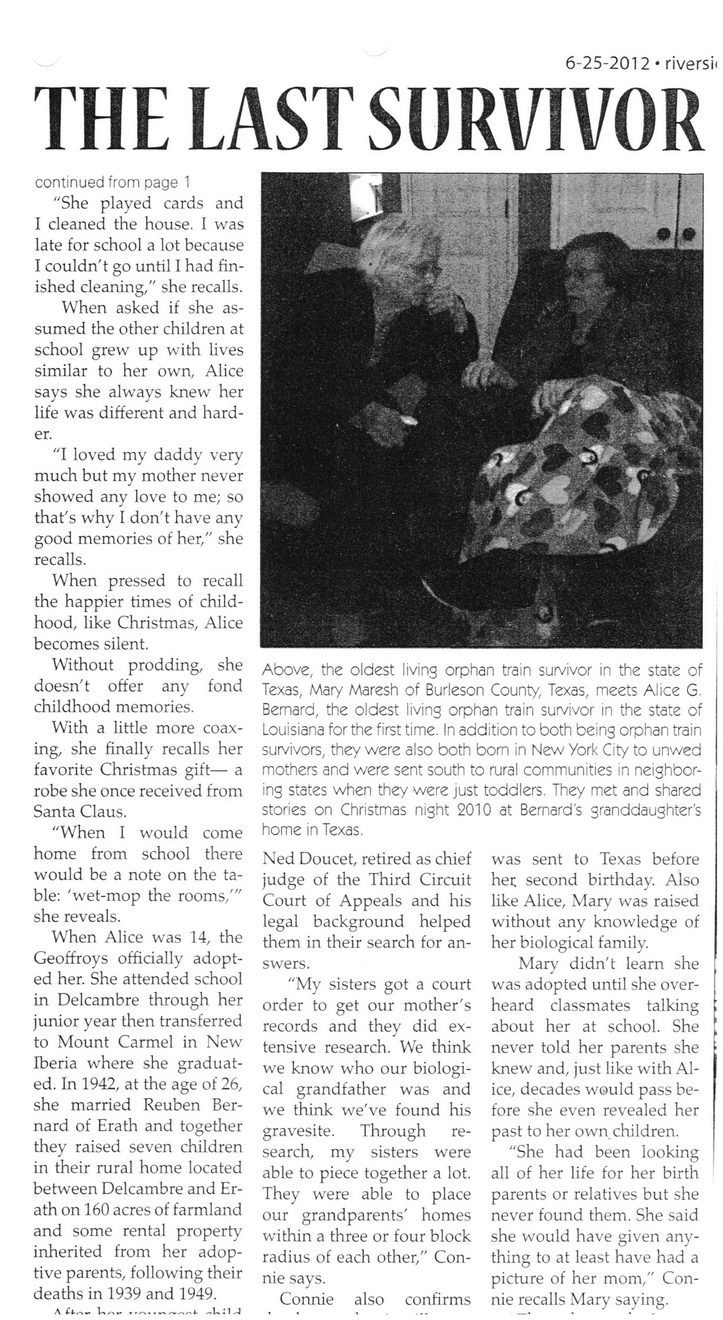This text was obtained via automated optical character recognition.
It has not been edited and may therefore contain several errors.
6-25-2012 • riversii THE LAST SURVIVOR continued from page 1 "She played cards and I cleaned the house. I was late for school a lot because I couldn't go until I had finished cleaning," she recalls. When asked if she assumed the other children at school grew up with lives similar to her own, Alice says she always knew her life was different and harder. "I loved my daddy very much but my mother never showed any love to me; so that's why I don't have any good memories of her," she recalls. When pressed to recall the happier times of childhood, like Christmas, Alice becomes silent. Without prodding, she doesn't offer any fond childhood memories. With a little more coaxing, she finally recalls her favorite Christmas gift— a robe she once received from Santa Claus. "When I would come home from school there would be a note on the table: 'wet-mop the rooms,"' she reveals. When Alice was 14, the Geoffreys officially adopted her. She attended school in Delcambre through her junior year then transferred to Mount Carmel in New Iberia where she graduated. In 1942, at the age of 26, she married Reuben Bernard of Erath and together they raised seven children in their rural home located between Delcambre and Erath on 160 acres of farmland and some rental property inherited from her adoptive parents, following their deaths in 1939 and 1949. Above, the oldest living orphan train survivor in the state of Texas, Mary Maresh of Burleson County, Texas, meets Alice G. Bernard, the oldest living orphan train survivor in the state of Louisiana for the first time. In addition to both being orphan train survivors, they were also both born in New York City to unwed mothers and were sent south to rural communities in neighboring states when they were just toddlers. They met and shared stories on Christmas night 2010 at Bernard's granddaughter's home in Texas. Ned Doucet, retired as chief judge of the Third Circuit Court of Appeals and his legal background helped them in their search for answers. "My sisters got a court order to get our mother's records and they did extensive research. We think we know who our biological grandfather was and we think we've found his gravesite. Through research, my sisters were able to piece together a lot. They were able to place our grandparents' homes within a three or four block radius of each other," Connie says. Connie also confirms was sent to Texas before her second birthday. Also like Alice, Mary was raised without any knowledge of her biological family. Mary didn't learn she was adopted until she overheard classmates talking about her at school. She never told her parents she knew and, just like with Alice, decades would pass before she even revealed her past to her own children. "She had been looking all of her life for her birth parents or relatives but she never found them. She said she would have given anything to at least have had a picture of her mom," Connie recalls Mary saying.

Orphan Train Riders of BSL Document (158)